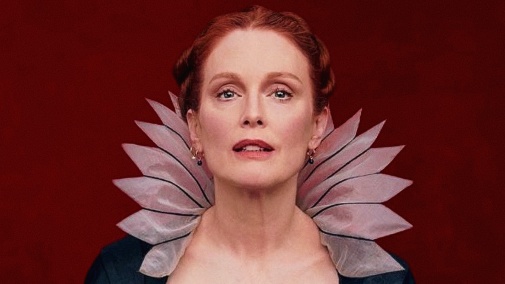
Mary & George, Starz's new miniseries, premieres today, with a new episode every Friday for the next few weeks. Christopher James recently reviewed the historical drama, detailing its intersection of smut and scheming, all centered around its titular characters during King James I's reign. Hot new thing Nicholas Galitzine plays George Villiers under the camera's lustful gaze, but it's Julianne Moore's Mary who commands the screen as his mother. To honor one of The Film Experience's favorite goddesses on this occasion, I decided to do one of my actress-y top tens, focusing on the Oscar-winner's best performances across a career rich in excellence…
In past lists of this ilk, I've imposed certain limitations to force myself into writing about lesser-acclaimed work and shine a light where one was needed. For Julianne Moore, however, it feels like her every step has been venerated on the site for over two decades, so it's not like any role lacks coverage. Moreover, despite a variety of worthy work, my top favorite Moore performances crystalized quicker than any of this intermittent series' previous subjects. In other words, I knew right away which ten turns I would write about, and any deviation from that path felt forced and, in a way, dishonest.
So, for this list, every credit in Moore's career was considered, be it TV or film, Oscar-heralded or otherwise. I also tried to weave honorable mentions throughout the write-up, erasing the need to enumerate a secondary list in the intro. Nevertheless, I'd like to highlight three examples I didn't fit anywhere else. The Woman in the Window and Dear Evan Hansen both bowed in 2021 to atrocious reviews, but Moore survived the mishap unscathed. Her suspicious skittishness in the former is the most impressive achievement of the two, but the actress deserves even more credit for whatever humanity she found within the latter's musical dreck.
Finally, there's the case of A Single Man, a slight, sonorous turn in a film that works better as a long-form perfume ad than as drama. Blazing in high style and bruised desperation, her supporting performance is one of those fated to show up in the Almost There series. There, I'll eventually have to negotiate my adoration for the actress with my distaste for Tom Ford's cinema. But that's a matter for another day. Now, let's delve into my Julianne Moore top ten, unranked and in chronological order. It starts with Louis Malle's last film, a workshop-like exercise staged in the ruins of the derelict New Amsterdam Theater. In my ideal world, it'd have been the first of many Oscar nominations for Julianne Moore.
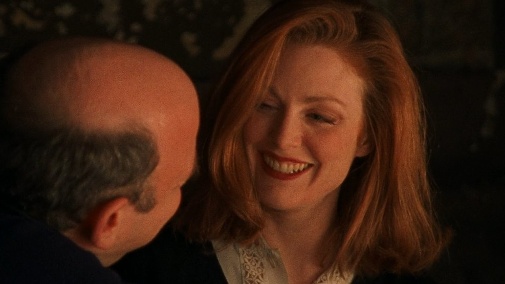
VANYA ON 42ND STREET (1994) Louis Malle
Few actresses have cried as much or as harrowingly as Julianne Moore in her films. It's such a constant that you can almost see it teetering on the edge of self-parody as the years go by. And yet, what strikes me most about her work in Vanya on 42nd Street is how much she smiles. Toothy grins with gums showing and a red lipstick frame define the actress' take on Yelena, even if tears roll down her face from time to time. She's quick to flash a Cheshire mask in tête-à-tête, smoothing over any discomfort or pause. In imagined close quarters and more intimate talk, a burst of laughter can diffuse tension. But grins and cries can also act like complimentary colors meeting in the middle, making each other look bolder than they are alone. Against mirth, despondency feels deeper.
A smile can further shock the viewer into attentiveness and psychological inquiry. Why does she react like this? To that? Why now and not then? It's not that Moore makes Yelena into a dramaturgical mystery, mind you. The actress merely taps into the enigmatic quality in every person, reaching for the human truths within the text. She also seems attuned to Chekhov's assertions that his plays were comedies rather than the somber tragedies, so many assume they are. In that regard, she brings a conversation pit into the theatrical space. It's not a dialogue between characters or a performer and her director. Instead, it's a meeting of minds beyond the threshold of death, the kind that occurs in artistic re-interpretation.
Vanya on 42nd Street is streaming on Tubi. You can also rent or purchase it on Apple TV+, Amazon, Google Play, and YouTube.
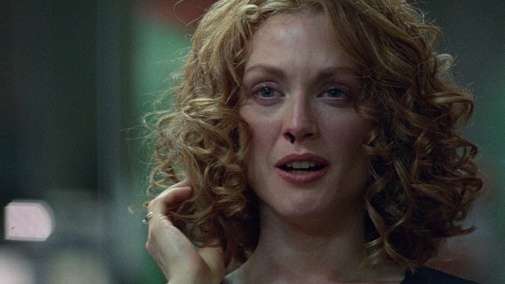
SAFE (1995) Todd Haynes
Alien famously advertised itself with the tagline, "In space, no one can hear you scream." Todd Haynes' sophomore feature could have used a variation of the same. Only, it'd say, "In suburbia, no one can scream." That's the impression you get from Julianne Moore's Carol White, a soft-spoken 1980s housewife whose voice seems incapable of registering above a polite whisper. Watching and hearing her, you can practically feel your throat contract in sympathy, vocal cords tense in twinned affliction with the woman on screen. And at times, she really looks like she could do with a good cry of anguish. For all intents and purposes, Carol feels like she's being attacked by the 20th century itself, her body allergic to every part of our modern world.
We thus return to the Alien reference, for Safe is the closest Haynes has ever come to a horror film. Though Moore dabbed in the genre at the start of her career, none of those roles compare to Carol. She's both a failure of a final girl and the monster pursuing her, all wrapped up in one collapsing organism. In the end, terror leads her to the comfort of a cult and, with it, the panacea of emptiness. Lacking interiority, she surrenders to the nothing, a conclusion Moore plays like a dream of self-effacement. It's legitimately terrifying, all the more intense because catharsis is out of reach. The scream that should be remains smothered. Compare this to Short Cuts, a very different, much louder, approach to suburban malaise – Julianne Moore has the range.
Safe can be rented or bought on Apple TV+, Amazon, Google Play, and YouTube.
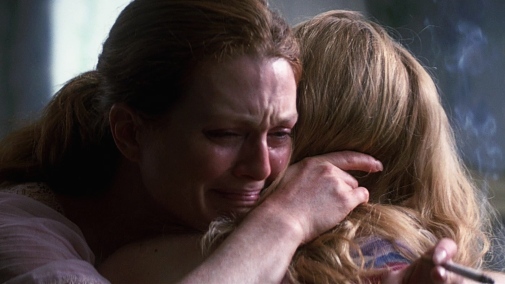
BOOGIE NIGHTS (1997) Paul Thomas Anderson
Amber Waves is a miracle, combining many of Moore's best attributes as a performer under one single role. Such plurality derives from Boogie Nights' epochal storytelling as much as it does from the actress' approach. She's chaos and she's order, an Altman movie synthetized and set loose on a PTA set, with a sniff of coke to boost it up to a fever pitch. Initially, Amber's a flinty presence, stealing scenes from their margins. But then we see her on set and get to witness the spectacle of a master thespian playing someone who couldn't act their way out of a paper bag. Comedy beats aplenty, flashes of giddiness come tainted with a whiff of despair.
By the time she's appreciating Dirk Diggler's flashy new home, Moore has opened a window into Amber's vulnerabilities, making them plain to see even when she's adopting a party girl persona. In montage, we later glimpse a displaced maternal instinct ran rampant, like a manic prelude to the picture's most maudlin passage. Or it would be maudlin if not for Moore, who conveys Amber's custody battles as a disruption that's almost more physical than sentimental. When she cries, it's not a plea for pity, but something uglier. It's a full-bodied convulsion that could pass for a death rattle, amplified under the microscope of PTA's camera.
Though Amber Waves wasn't the first time Moore played a mother, it represents that side of her career in its most prototypical form. She's great at it, especially when the women portrayed fit poorly into the caretaker role. My mind goes straight to two egoists who, whether showing neglect or blindsided moralism, can't seem to parent their children – What Maisie Knew and the recent When You Finish Saving the World.
Boogie Nights is streaming on AMC+. You can also rent or purchase it on Apple TV+, Google Play, YouTube, and VUDU.
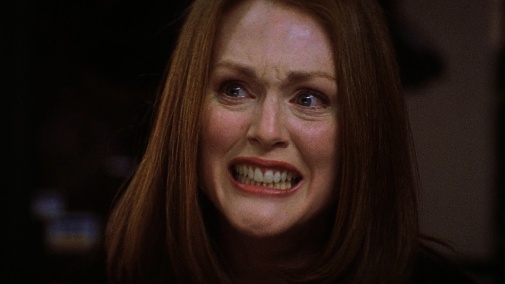
MAGNOLIA (1999) Paul Thomas Anderson
I've written an entire Almost There analysis on Moore's second PTA collaboration, so I won't belabor the point. It's one of her most polarizing creations, earning infamy from the extreme nature of its stylistic swings. Always running from room to room, simmering to a boil, or exploding outright, her Linda Partridge is a pressure cooker of guilt turned into a bomb. Crying outrage at an attorney and spitting fire on the face of pharmacists, she knocks one potential Oscar clip after another, taking them to such heights they become grotesques, past the boundary separating serious actin from flesh and bone cartoons. It's too much and just enough, the sort of thing that could only work within a film as odd as Magnolia.
Like with Boogie Nights, Moore's tears aren't a means of reaching out to the viewers. Instead, they're daring them to recoil. However, this time around, AMPAS wasn't so keen on rewarding the effort with a nomination. Then again, Julianne Moore was included in the Best Actress race of 1999, thanks to The End of the Affair. Overall, it was a banner year for her, since she also had A Map of the World which demanded a frank look at a woman dealing with unimaginable loss. Cookie's Fortune brought Moore into the Robert Altman fold for a second time, while An Ideal Husband let her experiment with catty stylizations in line with Wilde's wit.
Magnolia is streaming on Paramount Plus, Showtime, and Fubo TV. You can also rent and purchase it on Apple TV+, Amazon, Google Play, YouTube, VUDU, and the Microsoft Store.
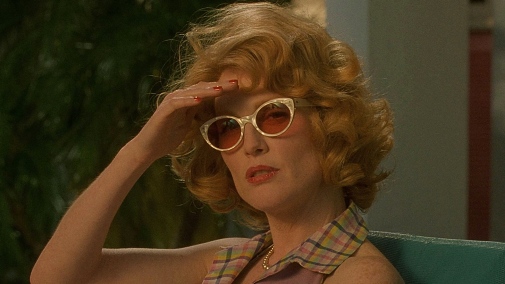
FAR FROM HEAVEN (2002) Todd Haynes
Whenever Haynes and Moore start playing with melodrama, their work becomes a question of idiomatic variations, derailments and divergences. There's no evident effort in their games, especially when it comes to the actress' experiment with dead styles. Rather than playing pastiche, she lets herself live within the rules of midcentury melodrama in the Sirkian tradition. She speaks its language – verbal, physical, spiritual - as a native tongue, and her arc isn't defined by overcoming those idioms. Instead, it lies in the growing awareness that she's trapped in a linguistic cage. To put it simply, Moore's Eisenhower-era housewife can't put into words what she's living through.
At times, her feelings seem too big to be expressed through the chosen register, and we sense a push against the prison bars. Seeing someone bristle internally, a shout trapped behind a smile is suffocating. You can practically feel the surface of her skin tremble like the ground by a volcano's base moments before eruption. But the lava never comes. Because, for it to spew molten fire on earth, Cathy Whitaker, Mrs. Magnatech herself, would need to know words she doesn't. It's not even a matter of ignorance. The language of Far from Heaven, in its many meanings, lacks terminology for what its story unravels. This tension remains unresolved, akin to an ancient poet trying to describe the sea without the word for "blue."
Even I, prone to garrulousness and florid writing, struggle to describe Julianne Moore's genius in Far from Heaven. It's the greatest of her many turns as 1950s women in domestic spaces. The same year Haynes' masterpiece came out and earned its star a Best Actress nomination, the Academy bestowed a second honor on Moore. She also competed for the Supporting Actress trophy with The Hours. Years later, she'd don similar stylings for The Prize Winner of Defiance, Ohio. And although the world would be a better place if we forgot Suburbicon's existence, I must commend it for giving us two midcentury Julianne Moores for the price of one.
Far from Heaven is streaming on Starz. You can also rent and purchase it on Apple TV+, Amazon, Google Play, YouTube, VUDU, and the Microsoft Store.

GAME CHANGE (2012) Jay Roach
Part of the reason why Julianne Moore is so beloved by cinephiles, yet struggles to capture the attention of awards bodies, is the fact she so seldom wastes time in the kinds of buzzy projects which dominate such chatter. Biopics are rarities in Moore's filmography, and the first time she indulged in those conventions, an Emmy fell on her hands. That's not to say she sold out or delivered subpar work. As Sarah Palin, the actress complicates a superficial script and subverts expectations. Mimicry factors into the portrayal, but there's more to it. She simultaneously acts against simple readings of Palin as a naïf and embodies all the infantility her figure could suggest.
The toddler-esque sullenness makes an appearance, as do all of the recognizable tics and quotes. But, in a crucial moment, Moore might drop the act, signaling that it is, up to a point, an act. Rather than passively copy-pasting the figure on TV, Moore imparts a point of view into her performative performance. Other biopic efforts of varying success include the fashion-forward aberration of Savage Grace, a film so beautifully alienating that its sex scenes play like a nature documentary on the mating rituals of exotic birds. They're steamy but detached. Freeheld is more traditional – and less interesting because of that – though it contains solid work from Moore.
Game Change is streaming on Max. You can also rent and purchase it on Apple TV+, Amazon, Google Play, YouTube, and VUDU.
![]()
MAPS TO THE STARS (2014) David Cronenberg
For all that I might have (over)written about the smiles in Vanya, this list is mostly bereft of comedy. Time to change that up, even if the humor in question is pitch-black, barbed, and fucked up beyond belief. You'd expect nothing different from David Cronenberg, even when considering one of his minor works. This is not minor Moore, however. Maps to the Stars earned her the Best Actress prize at the Cannes Film Festival, and it's easy to see why the jury was so besotted. Playing a Carnival mirror reflection of 21st-century celebrity, she embraces the hoariest aspects of her character's anxieties on aging and self-image. Moving past Norma Desmond clichés, Moore strides toward something much weirder.
How can one forget the slack distortions of a mouth puffed by fillers, trying to wrap around emotions that might be beyond its range of motion? At times, Moore's Havana Segrand – what a name! – looks like she's overcompensating for some facial tightness we can't quite perceive. Then there are her obvious lies, the woman's inability to conceal her giddy reaction upon hearing of a rival's misfortunes. The tour de force calls to the audience's most cruel instincts and makes us laugh while at it. Other comedic highlights of Moore's career tend toward the naturalistic – The Kids Are All Right and Don Jon – or the purposefully clownish – The Big Lebowski and 30 Rock. Maps to the Stars is in the middle, too recognizable for comfort, too broad to be respectable. It's a nasty piece of work.
Maps to the Stars is available to rent and purchase on Apple TV+, Amazon, Google Play, YouTube, and VUDU.
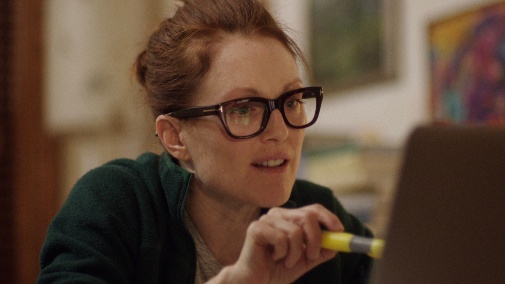
STILL ALICE (2014) Richard Glatzer & Wash Westmoreland
As a student of human behavior, Julianne Moore is formidable at portraying a person's reckoning with their crumbling sense of reality. It's a factor in many films discussed so far, as well as other titles like the semi-impersonal pathos of Blindness. It's also a significant aspect of the performance that would earn her a Best Actress Oscar. In Still Alice, Moore is tasked with articulating the experience of a mind losing complete awareness of its surroundings, cognitive function, and even its sense of self. She's Dr. Alice Howard, an academic whose whole life is constructed around matters of linguistics. One day, not long after her 50th birthday, she forgets a word during a lecture, and everything starts to discombobulate from there.
Still Alice dramatizes the toll of early onset Alzheimer's, a film constructed around Moore's ability to make the condition read as affecting cinema and respectful reproduction of reality. She succeeds and then some, sustaining the entire enterprise while avoiding the pitfalls that can come with such projects. Alice is always a multidimensional person, never a meat puppet defined by her illness. Moreover, her specificity is essential to Moore's dramatic strategy, its erosion meticulously foregrounded as the film walks to its downer ending. Lived-in details abound, like using a marker to keep track of a speech when the capacity to remember the beginning of a sentence has vanished, never to be recovered.
Still, Alice is streaming on Max. You can also rent it on Amazon and VUDU. It's also available for purchase on Apple TV+, Google Play, and YouTube.
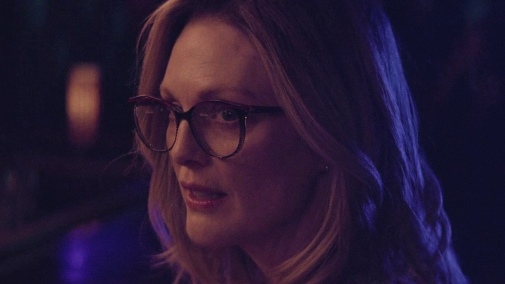
GLORIA BELL (2018) Sebastián Lelio
Remakes can be a dicey prospect, inviting comparison and accusations of redundancy. I used to be against them on principle until I learned to be a tad more tolerant and accepting, to keep my mind open to cinema's many possibilities. Part of that evolution derives from the impact of particular titles, including Gloria Bell. Lelio's Hollywood remake of his own earlier film is almost a shot-for-shot replica, distinguished primarily by its spoken language and more polished production values. Putting Juliane Moore's Gloria side-to-side with Paulina Garcia's take on the same character also reveals how tiny changes can build up to a world of difference.
The American woman feels fundamentally lonelier than her Chilean counterpart, while less formidable or put-together. You never doubt Garcia will survive the story with her heart intact, but Moore suggests a bigger risk. At the same time, she's breezier, less concerned with transmitting to the audience the idea of a fully-formed dramatic character. Instead, her Gloria is an assortment of behavioral observations so deftly conveyed they create the impression of a person. And not just any person. Someone you feel like you know intimately. Someone you root for and learn to love across a feature's length. When the world blows up, she wants to go down dancing. At the end of Gloria Bell, you almost wish you were there, dancing together to the world's end.
It should be said that this is far from Moore's only adventure into the realm of remake. She took part in Gus Van Sant's highly misunderstood and underrated Psycho, and is the best thing about After the Wedding. There's also a litany of literary adaptations with previous screen lives. Think The End of the Affair and the shadow of Deborah Kerr's take on the same role.
Gloria Bell is streaming on Max and Kanopy. You can also rent and purchase it on Apple TV+, Amazon, Google Play, YouTube, and VUDU.
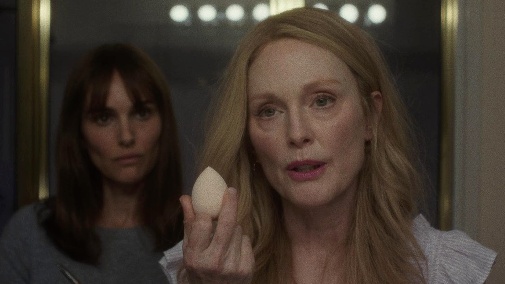
MAY DECEMBER (2023) Todd Haynes
Throughout her career, Julianne Moore has played many a woman who has lost control of themselves, internally if not externally. May December's Gracie, however, has learned to weaponize that perceived lack of control. Her gross choices, her unstable reactions are all part of learned helplessness and a dangerous consequence of white hyper-femininity. The barrier between feigned and genuine hysteria is porous to the point one can't distinguish one from the other. And through these facets of Gracie's personality and personal influence, we're led to find humor. It derives from the heightened melodrama, the oddity of her lisp, the juxtaposition of sound and image, everything orchestrated by Todd Haynes in peak "mad genius" form.
I won't write more about this performance because Nick Taylor has already said everything worth saying. Go read his analysis if you love great writing on cinema, acting, and the marvel of Moore under Haynes' direction. I'll also advise you to seek the two collaborations I haven't mentioned. While inhabiting a small part of I'm Not There's mosaic, the actress is pitch-perfect. And though I wish another person had been hired to play her second character in Wonderstruck, the silent movie portions of that underrated film give Moore a chance to play with a set of tools and styles she hadn't yet tried. Even if you consider them minor Haynes, they're worth the watch.
May December is streaming exclusively on Netflix.
What about you, dear reader? What's your Julianne Moore top ten?